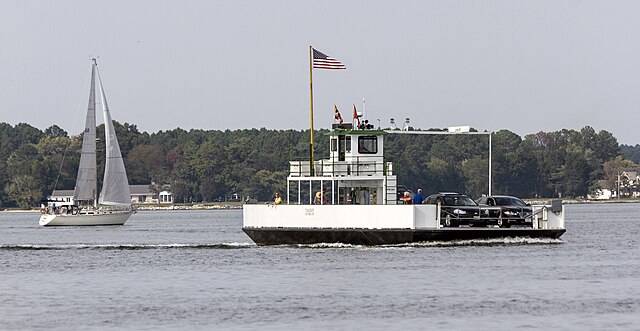Unfolding the Map
 Another ferry crossing, this time from Oxford to Bellevue, Maryland. William Least Heat-Moon (LHM) mentions that this ferry is the oldest operating ferry in the U.S., but he doesn't mention a very interesting part of its early history: women owner-operators ran the ferry in some of its earliest times. To see where this historic ferry is located, go to the map. At right is a leaf of the white oak, the Maryland state tree.
Another ferry crossing, this time from Oxford to Bellevue, Maryland. William Least Heat-Moon (LHM) mentions that this ferry is the oldest operating ferry in the U.S., but he doesn't mention a very interesting part of its early history: women owner-operators ran the ferry in some of its earliest times. To see where this historic ferry is located, go to the map. At right is a leaf of the white oak, the Maryland state tree.
Book Quote
"I took the Tred Avon ferry, at three centuries the oldest operating cable-free ferry in the United States, to Bellevue and drove out the double-fingered peninsula toward Tilghman Island."
Blue Highways: Part 9, Chapter 15
 The Tred Avon ferry, also known as the Oxford-Bellevue Ferry, near Oxford, Maryland. Photo by Acroterion and hosted at Wikimedia Commons. Click on photo to go to host site.
The Tred Avon ferry, also known as the Oxford-Bellevue Ferry, near Oxford, Maryland. Photo by Acroterion and hosted at Wikimedia Commons. Click on photo to go to host site.
Bellevue, Maryland
I was struck first by the description "the oldest operating cable-free ferry in the United States." While that might not seem remarkable, you must remember that in these days of powerful diesel engines, we rarely think about how things worked before. Let me give you a little perspective. The Tred Avon Ferry, also known as the Oxford-Bellevue ferry, was first started in 1683, well before motors were invented for boat travel.
The first Tred Avon ferry, according to their website, was a scow and it was driven by the side-to-side sweep of a large oar attached to the back of the boat. Such boats were very difficult to operate because you had to find a man that was skilled in steering yet strong enough to sweep the oar to move the boat. Such men were hard to find. A sail could help when the wind was up, but given that the ferry had regular schedules one couldn't count on the wind being right all the time. However, the service was essential because without crossing by ferry, the alternative was a 25-mile detour which, in the days of horses and carriages, make a day or two difference. Even in our age of fast-moving autos, the ferry cuts about 30 minutes off of a trip.
The ferry was, and has always been, a subsidized service of Talbot County, Maryland. The first operator of the ferry, a Richard Royston, received 2500 pounds of tobacco a year in exchange for operating the ferry service. He later turned out to be a forger who was sentenced to be publicly whipped, and after his death at sea he was formally condemned in the Maryland Assembly as a "notoriously scandalous" man. Later operators of the ferry also received compensation, with the payment of tobacco eventually turning into monetary subsidization.
The ferry has made strides since those days. Sails and scupper oars were replaced by engines, and boats went from scows to types that could carry cars and people. But what's really fascinating about this ferry is not it's establishment or the type of boats it has used. It's the people who have operated it. The names and dates that jump out to me as I read through its history are the following:
1690s - Amy Jensen
early 1700s - Judith Bennett
1737 - Catherine Bennett
1750s - Elizabeth Skinner
I think it's obvious why these names captured my attention, but I'll belabor the point. In a time where women, at least officially, were considered to be essential to the home, too inferior and delicate to trouble themselves about politics and business, and were denied the right to formally and officially participate in the political process, we find that four women owned and operated an essential service in Maryland.
At second glance, this might not be as amazing as it appears. The fact of the matter is that the colonies at this time were mostly wilderness, and the people who lived there true pioneers. Regardless of what the official status of women might be in such places, in reality women had to be ready to do whatever was expected of men, and often a lot more. They not only had to be able to keep house and raise children, but also be ready to take on the role of a man especially if he became laid up or if he died. Women on the frontier belied the notion that women were frail things, too delicate to overexert themselves about the troubles of the world. Those notions were born in the salons of men of culture and power, supported by religious interpretation led by males in religious heirarchy, and perpetuated in the populace.
When women have been thrust into situations where they have been allowed to use their ingenuity and strength, they easily keep up with men and often exceed them. When women have been given the opportunity to challenge themselves, they rise to it. In the recent elections in the United States, the role of women in society continued to be debated, with some arguing that women have lost their purpose as a part of a larger war on men and should focus on a more limited role. There was continued debate about choices about occupations and personal decisions that women should be allowed in society. Data show that women are still underpaid compared to men for performing similar roles. Despite that they are just greater than 50% of the population, they continue to be underrepresented in legal, scientific and technical professions, business leadership and in politics. While nobody in the United States questions whether women can meet the challenges and problems of the world anymore, there has still been a backlash against women going outside of "traditional roles" even though it is often necessary and required if families are to survive in today's world. And in some other parts of the world, tradition has locked women into a mediaeval conception of what they are capable of, and what they are allowed to do.
Yet if we look at history, we can see that regardless of the restrictions on women, events and situations have empowered some remarkable women representing all classes of society. Women stand out as leaders in history not only because they went against the norm, but also because they did amazing things. How many more remarkable women have escaped our awareness because history didn't record their exploits?
That is why these names, obscured to me until reading about the interesting history of the Tred Avon ferry, are so significant. They stand in stark contrast to prevailing notions of the time, such as that women are not truly capable of running a business. Really, there are two things that stand behind these notions and suspicions: that women aren't to be trusted and that men will lose their favored place in society. And yet, when we really look at history, and observe the actions of our foremothers, our wives, our sisters and our daughters, we all know that there is no truth behind those notions. The female owners and operators of small frontier ferry are another small but important proof added to the record of the accomplishments and abilities of remarkable women. Today, a quick look at the ferry's website reveals that one of the captains of the ferry, and a co-owner, is a woman named Judy Bixler. She continues the tradition of the unique contributions that women have made to the oldest American ferry service.
For myself, I look forward to the day when the idea of "unique," "amazing" and "remarkable" women ceases to be so surprising.
Musical Interlude
I was trying to find a suitable song to fit the post. I ended up with this surprise discovery of Celebrate Woman by the 2beat Band. I doubly like the song because I can use it on the Global Music Show that my wife and I do on our local radio station.
If you want to know more about Bellevue
Annapolis Landscape TV on Youtube: Oxford-Bellevue Ferry
Washington Post slideshow: Oxford-Bellevue Ferry
Wikipedia: Bellevue
Next up: St. Michaels, Maryland